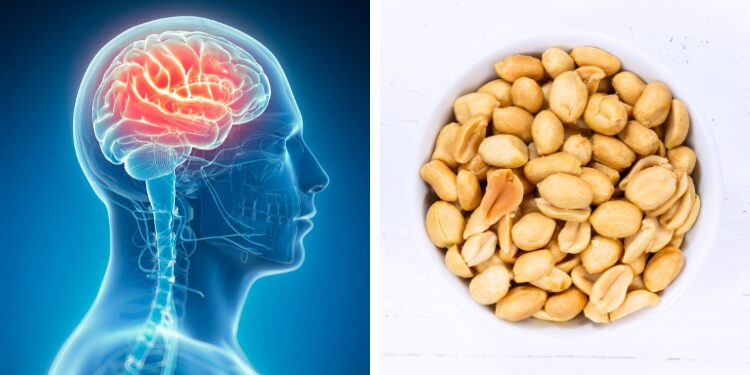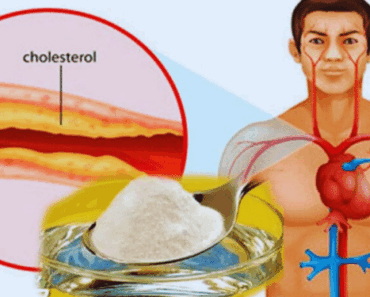Peanuts are one of those humble foods most of us take for granted – tossed into snack mixes, spread on toast, or sprinkled over salads.
But behind that familiar crunch lies a remarkable source of brain-boosting nutrients, plant-based energy, and long-lasting vitality.
The Nutritional Powerhouse Inside Every Peanut
Peanuts are technically legumes, not nuts, but nutritionally they behave much like tree nuts – rich in healthy fats, protein, vitamins, and antioxidants.
Just a small handful (about 30 grams) contains:
- Around 7 grams of protein
- Over 2 grams of fiber
- About 14 grams of heart-healthy monounsaturated and polyunsaturated fats
- A wealth of B-vitamins, including niacin and folate
- Minerals like magnesium, phosphorus, and manganese
- Powerful antioxidants such as resveratrol and p-coumaric acid
Together, these nutrients create a synergy that fuels the body and protects the brain from oxidative stress – the kind of cellular wear and tear that contributes to aging and fatigue.
How Peanuts Affect Your Brain
The brain is one of the most energy-hungry organs in the body. It needs a steady supply of healthy fats, amino acids, and micronutrients to function efficiently. Peanuts deliver exactly that.
1. Peanuts Boost Memory and Cognitive Function
Peanuts are one of the richest plant sources of niacin (vitamin B3) and resveratrol, both of which play key roles in protecting brain cells.
Niacin supports energy metabolism within neurons and helps repair DNA damage – crucial for maintaining mental sharpness as we age.
Studies suggest that a diet rich in niacin may reduce the risk of cognitive decline and Alzheimer’s disease.
Resveratrol, the same antioxidant found in red wine and grapes, improves cerebral blood flow. By enhancing circulation to the brain, it helps deliver oxygen and nutrients more effectively, supporting focus and mental clarity.
Regular peanut consumption has been linked with better cognitive performance in older adults, particularly in memory and verbal fluency tests.
2. They Nourish Brain Cells with Healthy Fats
The brain is made up of nearly 60 percent fat, and its structure depends heavily on the type of fats we eat.
Peanuts are rich in monounsaturated fats, the same type found in olive oil and avocados.
These fats help:
- Maintain the integrity of brain cell membranes
- Support neurotransmitter activity
- Reduce inflammation that can interfere with brain signaling
Unlike processed oils or trans fats, peanut fats are anti-inflammatory and promote long-term brain health. Eating peanuts regularly helps your brain cells stay flexible and resilient.
3. They Balance Mood and Support Mental Well-Being
Peanuts contain the amino acid tryptophan, a precursor to serotonin, the brain chemical responsible for mood balance and relaxation.
Adequate serotonin levels are linked to better sleep, emotional stability, and lower anxiety.
In addition, peanuts are a good source of magnesium, which plays a major role in regulating the nervous system.
Magnesium deficiency is often associated with stress, fatigue, and irritability. A handful of peanuts can help restore calm and mental focus naturally.
4. They Protect the Brain from Oxidative Damage
Every day, your brain is exposed to oxidative stress caused by environmental toxins, poor diet, and normal metabolic processes.
Over time, this can damage neurons and contribute to premature aging and neurodegenerative diseases.
Peanuts fight back with antioxidants like resveratrol, p-coumaric acid, and vitamin E. These compounds neutralize free radicals and improve cellular resilience.
Research from the University of Florida found that peanuts have a surprisingly high antioxidant capacity – even comparable to some berries. Roasting them actually increases this benefit by enhancing the release of polyphenols from the peanut skin.
5. They Enhance Focus and Concentration
Peanuts supply a slow, steady source of glucose, which is the brain’s main fuel. Unlike sugary snacks that cause quick spikes and crashes in blood sugar, peanuts release energy gradually, keeping your mental performance stable for hours.
This makes them an ideal snack for students, professionals, or anyone who needs sustained concentration without feeling drained later.
How Peanuts Boost Energy and Stamina
If you’ve ever noticed that peanuts keep you full longer than most snacks, that’s because they provide a perfect balance of protein, fats, and fiber – the trio responsible for lasting energy.
1. A Natural Energy Source
Each peanut contains healthy fats that metabolize slowly, giving you a steady stream of energy rather than a short burst.
Unlike refined carbohydrates, which burn quickly, the calories in peanuts are nutrient-dense and satisfying.
A handful in the morning or midday can help prevent the dreaded afternoon crash by stabilizing blood sugar and providing essential fuel for muscles and brain alike.
2. Protein for Strength and Recovery
Peanuts are often called the “poor man’s protein,” but nutritionally, they rival many animal sources.
The high protein content supports muscle recovery, hormone production, and enzymatic function, all of which contribute to sustained vitality.
Combined with their magnesium and potassium content, peanuts help maintain electrolyte balance – essential for physical endurance and reducing post-exercise fatigue.
3. Keeps Blood Sugar Stable
Stable blood sugar means consistent energy and fewer cravings. The fiber and healthy fats in peanuts slow down carbohydrate absorption, preventing energy crashes.
This is particularly helpful for people managing diabetes or insulin resistance. Studies show that eating peanuts before or with a meal can reduce post-meal blood sugar spikes by up to 20–30 percent.
4. Supports Heart and Circulatory Health
Energy levels are tied directly to blood flow and oxygen delivery. Peanuts support cardiovascular function through their high levels of arginine, an amino acid that helps dilate blood vessels and improve circulation.
Better circulation means more oxygen reaching tissues – including the brain and muscles – resulting in greater stamina and alertness.
The Science-Backed Health Benefits of Eating Peanuts Daily
Beyond brain and energy improvements, daily peanut consumption supports overall wellness in surprising ways.
- Reduces the risk of heart disease – Regular intake of monounsaturated fats and antioxidants in peanuts helps lower LDL cholesterol and triglycerides.
- Supports weight management – The combination of protein and fiber promotes satiety, helping control appetite naturally.
- Improves gut health – Peanut skins contain prebiotic compounds that feed beneficial gut bacteria, which in turn influence mood and energy.
- Provides key micronutrients – Peanuts are a source of folate, zinc, and copper, which aid in DNA repair, immune function, and energy metabolism.
How Much Is the Right Amount?
Moderation is key. For most adults, a small handful (about 1 ounce or 28–30 grams) per day provides optimal benefits without excess calories. That’s roughly:
- 30–35 whole peanuts, or
- 2 tablespoons of natural peanut butter
To keep it healthy:
- Choose unsalted, dry-roasted, or raw peanuts.
- Avoid sugary, flavored, or hydrogenated peanut products.
- If using peanut butter, look for versions with no added oils or sugar – just peanuts (and maybe a pinch of salt).
The Best Times to Eat Peanuts for Maximum Benefits
- Morning: Add peanuts or peanut butter to oatmeal, smoothies, or toast for a steady energy release that lasts all morning.
- Midday snack: A handful of peanuts keeps energy stable and prevents overeating later.
- Before exercise: Provides quick fuel for endurance and reduces muscle fatigue.
- Evening: A small spoonful of peanut butter can balance blood sugar overnight and promote restful sleep thanks to its tryptophan content.
Potential Drawbacks and Who Should Be Careful
While peanuts are incredibly nutritious, they aren’t suitable for everyone.
- Allergies: Peanut allergies can be severe. If you have a known allergy, avoid them entirely and opt for alternatives like almonds or sunflower seeds.
- Aflatoxins: Poorly stored peanuts can harbor aflatoxins – natural molds that are toxic in large amounts. Always choose reputable brands and store peanuts in a cool, dry place.
- Calorie density: Peanuts are calorie-rich. Overeating them can lead to unwanted weight gain, so stick to moderate portions.
Peanuts vs. Other Nuts: How They Compare for Brain and Energy
| Nutrient | Peanuts | Almonds | Walnuts | Cashews |
|---|---|---|---|---|
| Protein (per oz) | 7 g | 6 g | 4 g | 5 g |
| Healthy Fats | High in monounsaturated fats | High in monounsaturated fats | High in omega-3 | Moderate |
| Magnesium | Excellent | Excellent | Good | Good |
| Antioxidants | Resveratrol, p-coumaric acid | Vitamin E | Omega-3 ALA | Zinc |
| Energy Boost | Stable, long-lasting | Moderate | Moderate | Mild |
Peanuts hold their own nutritionally – often outperforming tree nuts in protein and energy density, at a fraction of the cost.
Eating peanuts every day is one of the simplest ways to boost brain health and maintain steady energy levels naturally.







